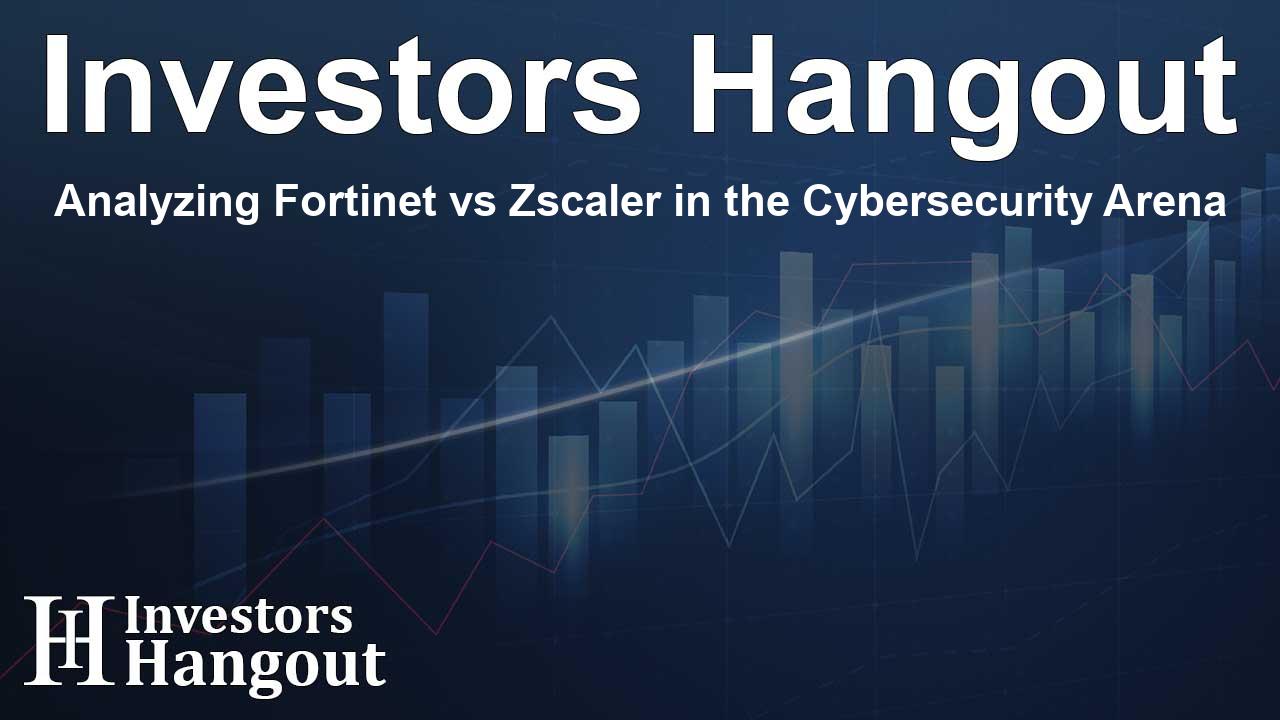Analyzing Fortinet vs Zscaler in the Cybersecurity Arena

Exploring Fortinet and Zscaler in Cybersecurity
Fortinet (NASDAQ: FTNT) and Zscaler (NASDAQ: ZS) are two key players in the rapidly expanding cybersecurity market, each with its own distinct approach. Fortinet boasts a comprehensive suite of endpoint security solutions that cater to on-premises environments, cloud platforms, and the Internet of Things (IoT). It has established itself as a formidable contender in the industry. On the other hand, Zscaler emphasizes agile, cloud-native "zero trust" services, treating every user as a potential threat, regardless of their status.
In the past year, Fortinet's stock has risen by 26%, while Zscaler has seen a slight decrease of 1%. This notable disparity prompts an important question: what factors contributed to Fortinet's success over Zscaler, and does it still represent the better investment opportunity?
Comparing Their Offerings
Fortinet made its mark with the introduction of next-gen firewalls (NGFWs), which enhanced traditional firewall capabilities through advanced network-filtering tools. This innovation laid the groundwork for its "Security Fabric," an integrated suite comprising over 50 services designed for both on-premises and cloud environments. With a customer base exceeding 775,000 worldwide, Fortinet has solidified its position as a leader in the cybersecurity sector.
In contrast, Zscaler does not provide on-site appliances, which can be expensive and cumbersome. Instead, it delivers its zero trust tools exclusively through subscription-based, cloud-native services that are continuously updated and scalable. With more than 7,700 customers, including a significant number from the prestigious Forbes Global 2000 list, Zscaler maintains a robust presence in the market.
Assessing Growth Rates
Since going public in 2009, Fortinet has enjoyed remarkable growth, achieving a compound annual growth rate (CAGR) of 24% from 2009 to 2019. This growth accelerated to 25% in recent years, boosting its revenue from $2.2 billion to $5.3 billion. However, forecasts suggest a slowdown, with expected revenue growth of only 9% to 11% in the upcoming year, potentially reaching between $5.8 billion and $5.9 billion.
Fortinet attributes this anticipated slowdown to various macroeconomic factors, reduced spending on security appliances following a temporary surge in 2022, and a cooling trend in NGFW upgrades. Additionally, intense competition from rivals such as Palo Alto Networks (NASDAQ: PANW) and CrowdStrike (NASDAQ: CRWD) is complicating Fortinet's market strategy.
On the flip side, Zscaler, which launched in 2018, has achieved an impressive CAGR of 48% from fiscal 2019 to 2024. This strong performance is largely driven by the increasing demand for zero-trust solutions in light of rising cybersecurity threats. For fiscal 2025, Zscaler anticipates revenue growth of 20% to 21%, marking its slowest growth rate since going public.
Investment Considerations: Fortinet vs Zscaler
When comparing the two, Fortinet's larger scale, broader range of services, and more favorable valuation make it an attractive investment option. While Zscaler's rapid growth is impressive, its profitability relies on non-GAAP earnings due to significant stock-based compensation expenses.
Fortinet's consistent profitability, combined with its proactive approach to advancing chip technology, positions it well for future growth. Analysts predict that Fortinet's adjusted earnings per share (EPS) will grow by 25% in 2024, although this is expected to slow to 10% by 2025. With a valuation of 33 times forward earnings, Fortinet's stock appears to be a more stable investment compared to its competitor.
In contrast, Zscaler's aggressive pricing strategies in a challenging market environment are expected to lead to declines in adjusted earnings for 2025. Currently priced at $157 per share, Zscaler has a high valuation factor of 55 times its expected earnings, making Fortinet a more appealing option for potential investors.
Concluding Thoughts on Investment
In summary, while Zscaler has shown remarkable growth, Fortinet presents a more diversified portfolio and a stronger financial foundation. For investors considering a $1,000 investment, Fortinet may offer a more reliable path for growth, given its established market presence and ongoing profitability.
Frequently Asked Questions
What are the main differences between Fortinet and Zscaler?
Fortinet provides a wide array of physical and cloud-based security solutions, whereas Zscaler specializes exclusively in cloud-native, subscription-based zero trust models.
How have stock performances of Fortinet and Zscaler differed?
Fortinet’s stock has increased by 26% over the past year, while Zscaler’s stock has decreased by 1%, highlighting a significant performance gap.
What is the future growth outlook for Fortinet?
Fortinet anticipates slower growth in the coming years, projecting a revenue increase of 9% to 11%, which could bring total revenue to around $5.9 billion.
Is Zscaler still a strong investment option?
Although Zscaler continues to grow, its slower growth rate and high valuation may make it less attractive compared to Fortinet.
What factors should investors consider when investing in cybersecurity stocks?
Investors should assess revenue growth, profitability, market competition, and the overall diversity of services when selecting cybersecurity stocks.
About The Author
Contact Thomas Cooper privately here. Or send an email with ATTN: Thomas Cooper as the subject to contact@investorshangout.com.
About Investors Hangout
Investors Hangout is a leading online stock forum for financial discussion and learning, offering a wide range of free tools and resources. It draws in traders of all levels, who exchange market knowledge, investigate trading tactics, and keep an eye on industry developments in real time. Featuring financial articles, stock message boards, quotes, charts, company profiles, and live news updates. Through cooperative learning and a wealth of informational resources, it helps users from novices creating their first portfolios to experts honing their techniques. Join Investors Hangout today: https://investorshangout.com/
The content of this article is based on factual, publicly available information and does not represent legal, financial, or investment advice. Investors Hangout does not offer financial advice, and the author is not a licensed financial advisor. Consult a qualified advisor before making any financial or investment decisions based on this article. This article should not be considered advice to purchase, sell, or hold any securities or other investments. If any of the material provided here is inaccurate, please contact us for corrections.
